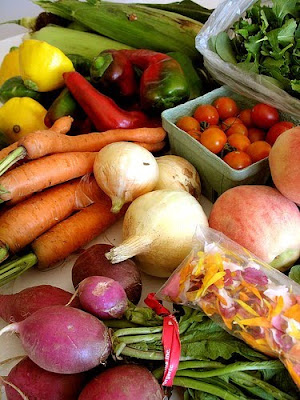
We decided to stick pretty closely to their 7 day eating plan. We generally eat pretty well, but it never hurts to have some expert help.
Can I just say . . . eating well is expensive!
As a kid, everything we had was hard-earned. I learned the value of penny-pinching by necessity, not choice. We shopped smart and ate smart. We gardened all summer and canned in the fall. We did pretty well, considering, but I know that my mom would have rather had some wiggle room for more food opportunity--trading the tuna mac for more vegetables, for example. (My mom, to this day, does not enjoy tuna mac.)
As an adult, I feel strangely settled into the middle class. Penny pinching is a wise choice, but it is a choice. We pinch when we can, and we've found value in paying more for just food. We usually get our produce from Green BEAN Delivery, meaning our local and organic produce is priced a touch lower than at the grocery, and it's conveniently delivered to our door. While it costs more than conventional produce, we feel it is worth it to buy food that is better for the environment, better for the people who grow and handle it, has less distance to travel, supports local agro-business, and ultimately tastes better and is better for us.
Since we were gone for 10 days, the cupboards were bare and we had to hit the grocery store. We spent 50% more than we normally do. Granted, we were stocking up, but it was painful. My childhood taught me many ways I could have saved $$ at the grocery. Organic soymilk is twice as expensive as conventional cow's milk. Organic spinach is over 4 times as expensive as conventional iceburg lettuce. Conventional eggs are half the price of eggs from cage-free, vegetarian fed hens. You get the picture.
I don't fault consumers for pinching pennies, especially in these economic times. Our food system has made cheap, abundant food mainstream--and even so, people are struggling. But food producers and suppliers (and I'm talking about top levels here) have been cashing in at our expense. Aside from issues of sustainability, how did it come to be that overprocessed, lower-nutrient foods are the norm? Why is it cheaper to eat yellow cake from a box than to eat a spinach salad? Why should it be a luxury to eat well?
Ben and I struggle with this as we weigh the cost of conventional vs. local, organic dairy. It hurts to pay more, and sometimes we go for cheap. But we can afford to shop our values, so we strive to. And basic economics tells us that increasing demand for quality food can lead to lower production costs, right?
I could write about food for days, and many people have done so much better than I could. Check out Food Inc or In Defense of Food, for starters.











1 comments:
just rsvp'd the book In Defense of Food!
Post a Comment